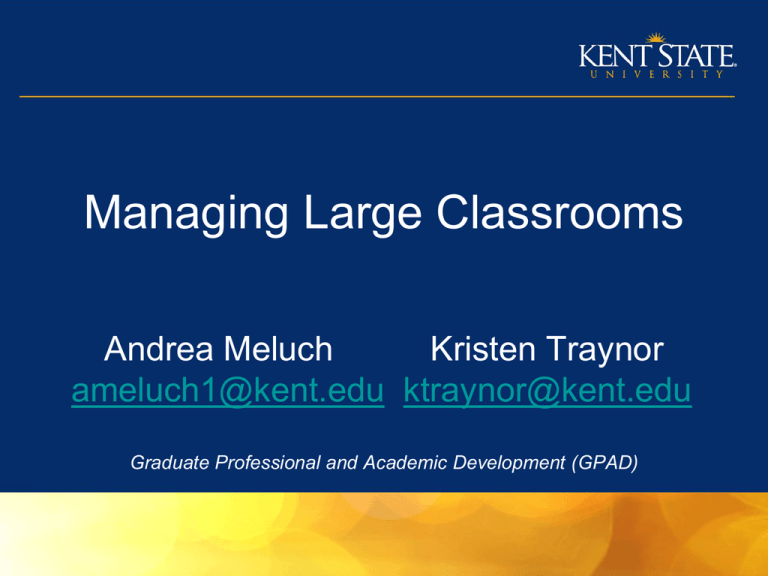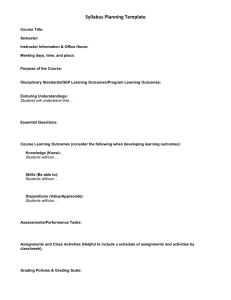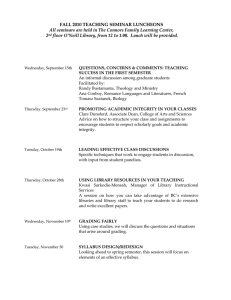Managing Large Classrooms Andrea Meluch Kristen Traynor
advertisement

Managing Large Classrooms Andrea Meluch Kristen Traynor ameluch1@kent.edu ktraynor@kent.edu Graduate Professional and Academic Development (GPAD) Preview Differences between large and small classes Planning for a large class Large classes in an online format Classroom discussions for large classes Managing your classroom Grading for large classes Dealing with grades and disputes Large versus Small Classes More students, more student needs. Unique classroom challenges: Lack of flexibility in planning and class activities. Meeting the diversity of your classroom. Students perceive anonymity. Managing high volumes of assignments. Managing classroom distractions. Unique personal challenges: Overcoming nervousness. You don’t really know your students. Overwhelmed by grading. Discussion Question What do you see as being a personal challenge to teaching a large class? Planning for Large Classes Writing your syllabus: Treat your syllabus as a contract. Remember the level of the course. Know the requirements that the course fulfills. Keep diversity and cultural backgrounds in mind. Know your classroom: How many students does it seat comfortably? How many entrances/exits are there? What is the technology set-up? Consider potential problems. Scheduling Create a weekly timeline for the semester and break it down by topic. Make sure that homework assignments, quiz, and exam due dates are clear. Consider grading time. Build in some flexibility. Think about your own schedule: Your deadlines (e.g., conferences, publications). Comps, thesis, or dissertation deadlines. Other commitments (e.g., outside jobs, service activities, extracurriculars). Writing Course Objectives What do you want students to get out of this class? Be specific and focused on the course. Objective, measureable, and attainable. What do you want students to learn? What is achievable in a large class? Discussion Question What are some examples of course objectives for large classes? Department Supplied Syllabi Some core courses will have a common syllabus; this is common for the large classes typical of general education requirements. If your department is supplying your syllabus be sure to ask questions to understand the policies (e.g., course objectives, attendance) before the start of term. Add your unique course information to your syllabus. Office Hours for Large Classes Vary from department to department. Important for large classes, where students may need individual attention. Schedule appointments outside of office hours. Notify students of any changes to office hours in advance. University Policies Student Accessibility Services (SAS) Policy. Academic Honesty (Cheating and Plagiarism). Course Policies Important tips for traditional and online courses: Be detailed. Have clear expectations. State what’s tolerable and what is not. Follow through. Be consistent with your rules. Course Policies Policies especially important to large classes: Technology use Classroom etiquette: Personal behavior Respect Eating/drinking Disruptions Teaching Large Classes Online Students don’t necessarily know how large the class is. Discussion groups are useful - large discussions can become unruly. Writing feedback can be challenging. Tips: Separate students into smaller discussion groups. Have weekly updates or podcasts to inform students of major class points. Consider more self-grading assessments. Have a general forum for general questions - limit multiple emails with the same questions. Classroom Discussions Give students plenty of time to answer. Don’t be too quick to jump in if there is silence. Pair students up and have them discuss together and then as a group. Have students write out summary of main points from the day’s lecture at the end of class and then share with the group. Use technology tools (e.g., Poll Everywhere App). Discussion Question Would you call on students in a large classroom for discussions? Why or why not? Keeping Attendance Records Tips: Have a sign-in sheet Post alphabetical sign-in sheets at the front Create seating chart Sign-in at the end of class vs. the beginning Assign written exercises periodically Discussion Question What potential challenges for keeping track of attendance would you anticipate? Managing a Large Classroom Arrive early Available for questions and set up Project your voice Use visuals, examples, and/or audiovisuals Move around during lectures Be strict about disruptive behavior Create different exam versions with same questions Tips for Teaching a Large Class Use prompts and small discussion groups Engage with individual groups Post basic outline of lectures Just bullet points Leave room for notes Leave blanks to fill in Hold a question time during office hours or host review sessions Self-evaluate what is going right or wrong Grading Scale A (100% - 93%) B + (89.9% - 87%) A – (92.9% - 90%) B (86.9% - 83%) B – (82.9% - 80%) C + (79.9% - 77%) C (76.9% - 73%) D + (69.9% - 67%) C – (72.9% - 70%) D (66.9% - 60%) F (59.9% and below) W, NF, SF, IF/ID, IP Grade Deadlines Withdraw without grade “W” Withdraw with grade “W” Midterm Grades (Freshmen) Final Grades (All) University Registrar Important Dates: http://www.kent.edu/registrar/fall-important-dates Rubrics What is a rubric? Breakdown of criteria Categories of strength Description of expectations Breakdown of points By category of strength Grading for a Professor Meet regularly and clarify Ask for grading key or double-check answers Get rubric or double-check yours Grade in pencil then pen Use Google Drive or Dropbox Use “track changes” on Word Documents Don’t be afraid to ask questions Grading a Large Class Spread out assignments for grading Use objective or scantron exams Set aside time to grade Set a timer Don’t leave wrong answer spaces blank Focus on major concerns first, then minor Balance positive and negative comments Update students’ grades on Blackboard Dealing with Grades and Disputes Family Educational Rights and Privacy Act (FERPA) Use the 24-hour rule for grade disputes Document all meetings, discussions, and emails Take time before responding Plagiarism and Cheating Policy Writing Commons or rewrites Plagiarism School SafeAssign Discussion Question What are some benefits to teaching large classes? Questions? Thank you!



